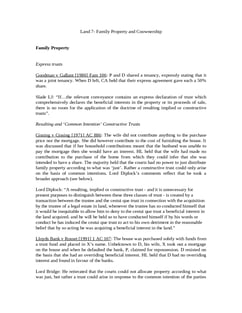Quennell v Maltby [1979] 1 All ER 568
Judgement for the case Quennell v Maltby
Table Of Contents
Plaintiff had a mortgage with X that prohibited letting out the house. He let it out to Defendant anyway.
Plaintiff’s wife, Y, then bought up the mortgage interest from the bank, X, and sued for possession against Defendant (Plaintiff wanted to sell the house and needed vacant possession).
CA found for Defendant, saying that since the wife was not exercising her powers as a mortgagee in order to protect or enforce the security but in order to obtain possession on behalf of her husband so that he could sell the house, she was treated as acting on behalf of her husband. Since the husband could not proceed against the tenants (statutory protection of their tenancy), nor could the wife on his behalf.
Lord Denning MR
A mortgagee will be restrained from getting possession except when it is sought bona fide and reasonably for the purpose of enforcing the security and then only subject to such conditions as the court thinks fit to impose.
Here, there is a bad ulterior motive of evicting the tenants and avoiding the Rents Acts, which equity will not allow.
Bridge LJ
The courts need to “look behind the formal legal relationship between the parties to see what is the true substance of the matter.”
In this case the wife is de facto Plaintiff’s agent.
For Further Study on Quennell v Maltby
Need instant answers? Our AI exam tutor is here to help.
Ask questions 🙋 Get answers 📔 It's simple 👁️👄👁️
Our AI is educated by the highest scoring students across all subjects and schools. Join hundreds of your peers today.
Get StartedSimilar Cases
Related Product Samples
These product samples contain the same concepts we cover in this case.

